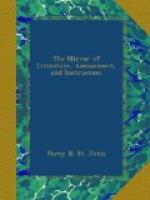by fire, and their children were baptized over the
corpses of their parents, according to the religion
of their murderers. These atrocities were in all
probability perpetrated by many, in order to possess
themselves of the wealth acquired by the Jews in traffic,
to take revenge for their usurious extortions, or,
finally, to pay their debts in the most expeditious
and easy manner. When it was found that the plague
was nowise diminished by massacring the Jews, but,
on the contrary, seemed to acquire additional virulence,
it was inferred that God, in his righteous wrath, intended
nothing less than to extirpate the whole sinful race
of man. Many now endeavoured by self-chastisement
to avert the divine vengeance from themselves.
Fraternities of hundreds and thousands collected under
the name of Flagellants, strolled through the land
in strange garbs, scourged themselves in the public
streets, in penance for the sins of the world, and
read a letter which was said to have fallen from heaven,
admonishing all to repentance and amendment.
They were joined of course, by a crowd of idle vagabonds,
who, under the mask of extraordinary sanctity and humble
penitence, indulged in every species of disorder and
debauchery. At last the affair assumed so grave
an aspect, that the pope and many secular princes
declared themselves against the Flagellants, and speedily
put an end to their extravagancies. Various ways
were still, however, resorted to by various tempers
to snatch the full enjoyment of that life which they
were so soon to lose, at the expense of every possible
violation of the laws of morality. Only a few
lived on in a quiet and orderly manner, in reliance
on the saving help of God, without running into any
excess of anxiety or indulgence. After this desolating
scourge had raged during four years, its violence
seemed at length to be exhausted.—
Ibid.
* * * *
*
WATERING PLACES IN THE FIFTEENTH CENTURY.
Baden, the well-known and much-frequented watering-place,
has been long celebrated. The following account
of it in the fifteenth century is interesting.
Those warriors who would wile away the interval between
one campaign and another agreeably, betook themselves
to Baden in Aargau. Here in a narrow valley,
where the Limmat flows through its rocky bed, are hot
springs of highly medicinal properties. Hither,
to the numerous houses of public entertainment, resorted
prelates, abbots, monks, nuns, soldiers, statesmen,
and all sorts of artificers. As in our fashionable
watering-places, most of the visitors merely sought
to dissipate ennui, enjoy life, and pursue pleasure.
The baths were most crowded at an early hour in the
morning, and those who did not bathe resorted thither
to see acquaintances, with whom they could hold conversation
from the galleries round the bath-rooms, while the
bathers played at various games, or ate from floating
tables. Lovely females did not disdain to sue




